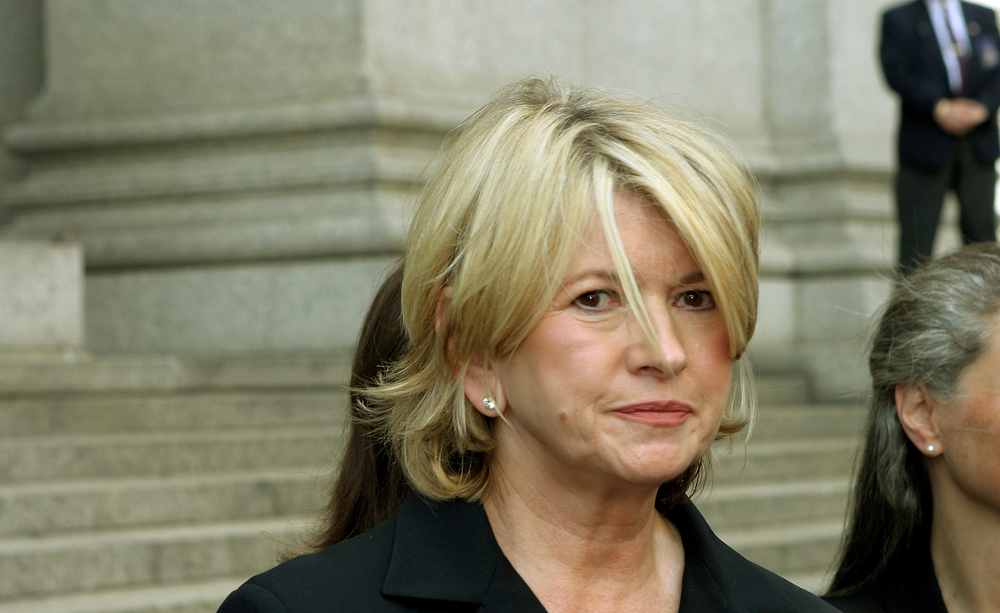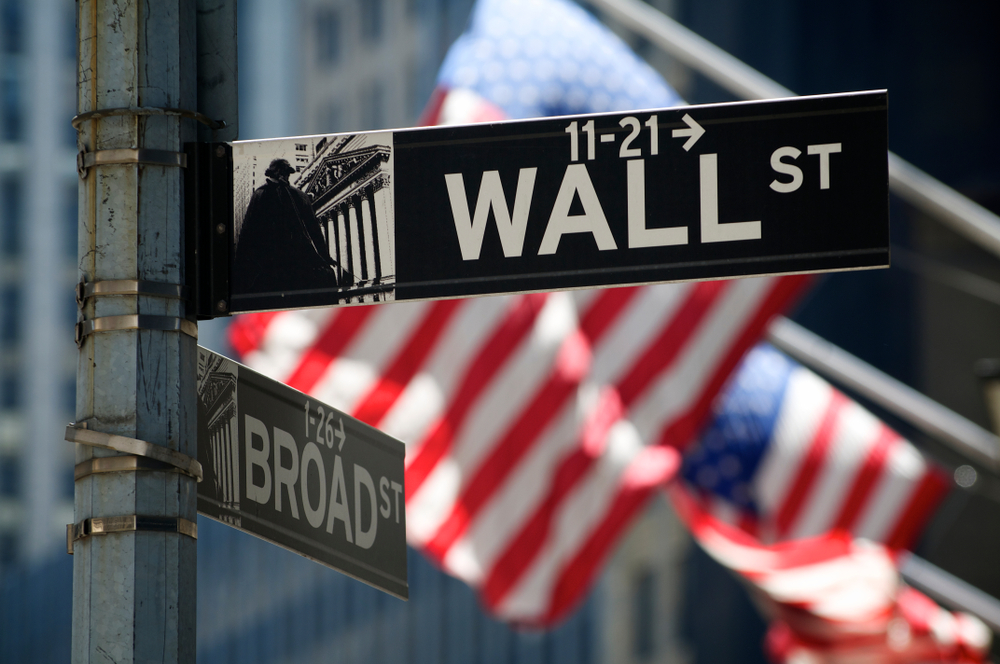The stock market is often seen as a place where fortunes are made and lost, but it’s not just the ebb and flow of market forces that stir things up. Over the years, a series of jaw-dropping scandals have unfolded, involving high-profile individuals who thought they could outsmart the system. Insider trading is a stain on the financial world, and while some have gotten away with it, others have paid the price with jail time.
1. The Infamous Martha Stewart Case

When you think of insider trading scandals, Martha Stewart’s name might come to mind. The domestic diva found herself in hot water when she sold nearly 4,000 shares of ImClone Systems based on a tip. According to the Securities and Exchange Commission, Stewart avoided a loss of $45,673 by acting on non-public information. Her friend, Sam Waksal, the CEO of ImClone, was trying to unload his shares before negative news about a cancer drug application hit the market. This case captured public attention not only because of Stewart’s celebrity status but also due to the dramatic courtroom scenes that followed.
Stewart was convicted of obstruction of justice and lying to investigators, leading to a five-month prison sentence. This scandal served as a stark reminder that no one is above the law, not even a beloved public figure. Despite the setback, Stewart managed to rebuild her empire post-incarceration. Her case highlighted the pitfalls of insider trading and the severe consequences that can follow. The ordeal also demonstrated how quickly an individual’s reputation can be tarnished by unethical decisions.
2. Raj Rajaratnam and the Galleon Group Debacle

Raj Rajaratnam, the billionaire founder of Galleon Group, was at the center of one of the largest insider trading cases in history. The scandal broke in 2009 when it was revealed that Rajaratnam had been obtaining and trading on confidential information for years. The investigation, which was bolstered by wiretap evidence, uncovered a web of corruption involving numerous Wall Street professionals. According to Reuters, the Department of Justice investigated and found that this insider trading network generated tens of millions in illicit profits. The case was significant not only for its scale but also for the aggressive tactics used by federal authorities.
In 2011, Rajaratnam was convicted of securities fraud and conspiracy, receiving an 11-year prison sentence. His downfall was a warning to others in the financial industry about the government’s determination to root out insider trading. The Galleon scandal also showcased the effectiveness of wiretaps, a technique traditionally used in organized crime investigations, in tackling white-collar crime. This case sent shockwaves through Wall Street, leading to heightened scrutiny and reforms aimed at preventing similar misconduct. Rajaratnam’s story is a classic tale of greed and ambition gone awry.
3. The Enron Scandal: A Lesson in Corporate Deception

Few corporate scandals are as notorious as Enron, a tale of ambition, deception, and financial ruin. While Enron’s collapse was primarily due to accounting fraud, insider trading also played a role. Executives sold stock based on non-public information, pocketing millions while shareholders and employees were left with nothing. According to PBS, CEO Jeffrey Skilling and chairman Ken Lay were key figures in orchestrating the company’s downfall. They painted a rosy picture of Enron’s financial health, while in reality, the company was hemorrhaging money.
Skilling was sentenced to 24 years in prison, although his sentence was later reduced. Lay died before sentencing, leaving many questions unanswered. The Enron scandal led to significant regulatory changes, including the Sarbanes-Oxley Act, which aimed to improve transparency and accountability in corporate governance. This case serves as a stark reminder of the catastrophic consequences of corporate greed and malfeasance. It remains a textbook example of what can happen when ethical boundaries are crossed in the pursuit of profit.
4. Dennis Levine: The Original Insider Trader

In the 1980s, Dennis Levine was a hotshot investment banker with a penchant for illicit profits. Levine engaged in insider trading by acquiring non-public information about mergers and acquisitions, which he used to trade stocks and earn millions. His activities went unnoticed for a while, thanks to a complex network of offshore accounts and unwitting accomplices. However, his luck ran out when the SEC launched an investigation and eventually uncovered his illegal deals. The scandal rocked Wall Street and highlighted the vulnerabilities in the system at the time.
Levine’s case was significant because it set the stage for future insider trading investigations. He cooperated with authorities, leading to the unveiling of a larger network of corrupt traders. Levine’s story underscores the temptation of easy money and the high stakes of getting caught. His eventual conviction and two-year prison sentence served as a cautionary tale for others. The scandal prompted tighter regulations and increased vigilance in monitoring trading activities. Levine’s narrative is an early example of how greed can lead even the brightest minds astray.
5. The Collapse of Bernie Madoff’s Ponzi Scheme

Bernie Madoff is synonymous with one of the largest and most devastating Ponzi schemes in history. Although not insider trading in the traditional sense, Madoff’s manipulation of the stock market through fraudulent means is worth mentioning. Madoff promised consistent returns to his investors, but in reality, he was using new investments to pay off earlier investors. His operation fell apart during the 2008 financial crisis when he could no longer maintain the illusion. The unraveling of Madoff’s scheme revealed the deep flaws in regulatory oversight and investor complacency.
Madoff was sentenced to 150 years in prison, symbolizing the severity of his crimes and their impact on countless lives. The scandal left a trail of financial ruin, with many investors losing their life savings. It also led to significant changes in how financial markets are regulated and spurred a renewed focus on investor protection. Madoff’s story is a sobering reminder of the potential for deception within the financial industry. The scandal continues to haunt the market, serving as a stark warning of the dangers of unchecked greed.
6. Ivan Boesky: Greed on Wall Street

Ivan Boesky was a prominent figure in the 1980s Wall Street scene, known for his bold and risky bets. However, his success was built on insider trading, as he routinely traded on confidential information acquired from corporate insiders. Boesky’s dealings eventually caught the attention of regulators, leading to a high-profile investigation. In 1986, Boesky agreed to a plea deal, paying a record $100 million fine and agreeing to cooperate with authorities. His testimony helped uncover a widespread network of illegal trading activities, affecting numerous high-profile figures.
Boesky’s downfall was a major scandal, shaking the confidence of investors and exposing the dark underbelly of Wall Street. His infamous comment, “Greed is all right, by the way,” became emblematic of the excesses of the 1980s. Boesky’s conviction and subsequent prison sentence marked a turning point in how insider trading was perceived and prosecuted. The scandal led to greater scrutiny and reforms intended to prevent similar abuses in the future. Boesky’s story remains a cautionary tale about the perils of unchecked ambition and ethical compromise.
7. R. Foster Winans and the Wall Street Journal Scandal

R. Foster Winans, a journalist for the Wall Street Journal, found himself embroiled in an insider trading scandal that blurred the lines between journalism and finance. Winans wrote the influential “Heard on the Street” column, which had the power to move markets. However, he began leaking information from his column to stock traders for profit. The scandal came to light when the SEC launched an investigation, leading to Winans’ arrest and conviction. This case highlighted the ethical responsibilities of journalists and the potential conflicts of interest that can arise.
Winans served a brief prison sentence, but the impact of the scandal was far-reaching. It raised questions about the role of media in financial markets and the potential for misuse of privileged information. The case prompted discussions about journalistic integrity and the need for clear ethical guidelines. Winans’ actions illustrated how even those outside the traditional financial sector could become entangled in insider trading. The Wall Street Journal scandal served as a reminder of the importance of maintaining ethical boundaries in all professions.
8. The Collapse of Barings Bank and Nick Leeson’s Role

Nick Leeson is infamous for his role in the collapse of Barings Bank, one of the oldest and most prestigious banks in the UK. As a rogue trader, Leeson engaged in unauthorized trades that eventually led to catastrophic losses for the bank. While not insider trading in the strictest sense, Leeson’s actions highlighted the dangers of unchecked trading practices. His manipulation of accounts and concealment of losses eventually led to the bank’s downfall in 1995. The scandal exposed significant flaws in risk management and internal controls within financial institutions.
Leeson’s conviction and imprisonment sent shockwaves through the banking industry, leading to calls for greater oversight and regulation. The Barings Bank collapse underscored the potential for individual actions to have far-reaching consequences. Leeson’s story remains a cautionary tale about the risks of a lack of supervision and accountability in the financial sector. The scandal led to a reevaluation of risk management practices, ultimately shaping the future of banking regulations. Leeson’s actions serve as a reminder of the need for vigilance and ethical conduct in financial markets.
9. Sam Waksal and the ImClone Systems Scandal

Sam Waksal, the former CEO of ImClone Systems, was at the center of a scandal that ensnared several high-profile individuals, including Martha Stewart. Waksal attempted to sell his company’s stock before negative news about its cancer drug application became public. His actions led to an insider trading investigation that uncovered a web of deceit involving numerous individuals. Waksal’s conviction for securities fraud marked a significant moment in the fight against insider trading. He was sentenced to over seven years in prison, underscoring the serious nature of his crimes.
The ImClone scandal highlighted the potential for corporate leaders to misuse their positions for personal gain. It served as a catalyst for increased regulatory scrutiny and reform in the pharmaceutical industry. Waksal’s downfall was a warning to corporate executives about the consequences of unethical behavior. The scandal also illustrated the interconnected nature of insider trading networks and the difficulties in unraveling them. Waksal’s story remains a testament to the importance of integrity and ethical leadership in the business world.
10. The Insider Trading Case of Rajat Gupta

Rajat Gupta, a former director at Goldman Sachs, was convicted of insider trading in a high-profile case that shook the financial world. Gupta was accused of leaking confidential information to Raj Rajaratnam, the billionaire founder of the Galleon Group. His actions were a significant breach of trust, illustrating the potential for even the most respected individuals to succumb to temptation. Gupta’s conviction was based on phone records and witness testimony, providing a clear picture of his involvement. He was sentenced to two years in prison, a reduced sentence due to his previously unblemished record.
The Rajat Gupta case highlighted the importance of maintaining ethical standards in corporate governance. It served as a reminder that no individual, regardless of their reputation or status, is above the law. The scandal underscored the need for stringent regulations and oversight to prevent insider trading. Gupta’s story is a cautionary tale about the dangers of personal ambition overriding ethical considerations. The case also demonstrated the effectiveness of collaboration between regulatory authorities in prosecuting insider trading.
11. The Case of Steven Cohen and SAC Capital

Steven Cohen, the billionaire hedge fund manager, was embroiled in one of the largest insider trading investigations in history. His firm, SAC Capital, was accused of engaging in widespread insider trading, resulting in significant profits. Cohen himself was not criminally charged, but his firm pleaded guilty to insider trading and paid a hefty fine. The scandal highlighted the challenges of holding high-profile individuals accountable in complex financial cases. SAC Capital’s plea deal underscored the seriousness of the allegations and the government’s commitment to tackling insider trading.
The Steven Cohen case brought attention to the culture of aggressive trading practices that often skirted ethical boundaries. It led to increased scrutiny of hedge funds and their trading activities. Despite the scandal, Cohen has managed to rebuild his career and reputation, raising questions about the lasting impact of such cases. The case served as a reminder of the need for robust regulatory frameworks to prevent and prosecute insider trading. Cohen’s story is a testament to the complexities of navigating the world of high finance and the potential for rehabilitation and redemption.
12. The Scandal Surrounding Anil Kumar and McKinsey & Company

Anil Kumar, a former director at McKinsey & Company, was caught in a web of insider trading involving his friend, Raj Rajaratnam. Kumar provided Rajaratnam with confidential information about McKinsey clients, which was used for illicit trading. The scandal came to light during the investigation into the Galleon Group, leading to Kumar’s arrest and conviction. Kumar’s actions were a significant breach of trust and confidentiality, damaging McKinsey’s reputation. He received a reduced sentence due to his cooperation with authorities, serving two years of probation.
The Anil Kumar case highlighted the potential for insider trading to occur even within respected consulting firms. It underscored the importance of maintaining ethical standards and vigilance in safeguarding client information. Kumar’s involvement in the scandal was a reminder of the temptations of financial gain and the consequences of unethical behavior. The case prompted discussions about the ethical responsibilities of consultants and the need for protective measures. Kumar’s story serves as a warning to professionals in all industries about the risks of compromising integrity for personal benefit.
13. The Fall of Arthur Andersen Amidst Enron Scandal

Arthur Andersen, once one of the world’s largest accounting firms, collapsed in the wake of the Enron scandal. The firm was found guilty of obstructing justice by shredding documents related to Enron’s financial misdeeds. While not insider trading per se, the scandal was tied to the misuse of confidential information. Arthur Andersen’s downfall was a significant moment in the history of corporate scandals, emphasizing the importance of ethical accounting practices. The firm’s conviction was later overturned, but the damage was already done, leading to its dissolution.
The collapse of Arthur Andersen had far-reaching implications for the accounting industry and corporate governance. It prompted significant reforms aimed at increasing transparency and accountability, including the Sarbanes-Oxley Act. The scandal served as a stark warning about the consequences of unethical practices and the importance of maintaining trust in professional services. Arthur Andersen’s story remains a testament to the need for integrity and ethical conduct in all aspects of business. The firm’s downfall is a reminder of the potential for reputational damage and the importance of adhering to ethical standards.
14. The Scandalous Journey of Joseph Nacchio and Qwest Communications

Joseph Nacchio, the former CEO of Qwest Communications, was convicted of insider trading after selling stock based on non-public information. Nacchio was aware of the company’s financial struggles and the fact that Qwest would not meet revenue targets. Despite this, he sold millions worth of stock, profiting while the company’s value plummeted. The scandal came to light following a broader investigation into accounting irregularities at Qwest. Nacchio’s conviction and subsequent prison sentence highlighted the potential for corporate leaders to misuse their positions for personal gain.
The Joseph Nacchio case underscored the importance of transparency and honesty in corporate leadership. It served as a warning to executives about the serious consequences of insider trading and unethical behavior. Nacchio’s downfall was a reminder of the responsibilities that come with corporate leadership and the need to prioritize the interests of shareholders. The scandal prompted discussions about the ethical standards expected of corporate executives and the need for regulatory oversight. Nacchio’s story remains a cautionary tale about the dangers of greed and the importance of integrity in business.
This article is for informational purposes only and should not be construed as financial advice. Consult a financial professional before making investment or other financial decisions. The author and publisher make no warranties of any kind.







